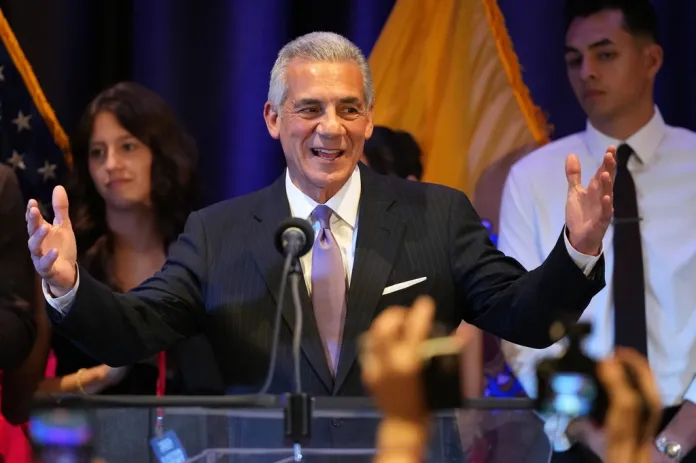A win for Democrats in blue New Jersey’s gubernatorial race was not surprising, but the victory was attributed to a larger trend at play: Republicans desperately need to work on voter turnout, and President Donald Trump needs to rethink how he conveys his policies.
Rep. Mikie Sherrill’s (D-NJ) decisive win against Republican Jack Ciattarelli, as well as other Democratic victories Tuesday night, have been brushed off by national Republicans as a predetermined outcome, arguing it is not reflective of how voters across the country perceive the GOP.
However, Sherrill managed to flip key counties that Trump won in 2024, and she attracted more of the Latino vote, a historically blue voting bloc that helped the president narrow his margin in the Garden State last November.

How did this happen?
The New Jersey election essentially boiled down to Ciattarelli’s inability to motivate Trump voters and supporters to turn out for the election, as well as a larger rebuke nationwide of Republican policies.
Republicans historically do not match Democrats’ turnout rates in non-presidential years. GOP voters often do not participate in early or mail-in voting, due to the party harboring suspicions over the method’s security in the wake of the 2020 election.
Since Trump emerged in the political arena, the GOP has consistently faced issues attracting supporters to vote in elections where the president is not at the top of the ballot.
National GOP strategist Brian Seitchik told the Washington Examiner that New Jersey was “always going to be an uphill climb,” but Tuesday was “the latest example of a reality that Republicans need to understand.”
“Trump voters are not reliable Republican voters,” Seitchik said.
“One thing that Republicans have done a very poor job of doing is motivating the Trump voters while attracting anyone else,” Brian Kirwin, a longtime Virginia GOP strategist, echoed.
And rallying Trump voters was a considerable part of Ciattarelli’s campaign. He linked himself closely to the president’s agenda, taking a gamble that it would drive out Trump’s supporters.
But it also came at a cost. By linking himself to Trump’s policies, he opened himself up to credible attacks from the Sherrill campaign. The government shutdown didn’t help matters either, playing a “tremendous role” in his eyes, said Hank Sheinkopf, longtime Democratic political consultant.
“Ciattarelli could not walk away from Trump,” he said. “He grabbed Trump’s hand and held it too tight. And Mikie Sherril knew how to break that, how to use that.”
Eyes were on the government shutdown, which reached 37 days as of Thursday, to see if it would negatively affect Sherrill, a sitting member of Congress who had voted against the Republican spending deal to fund the government. But the Trump administration’s decision to freeze funds for critical infrastructure projects connecting New Jersey to New York likely led to Ciattarelli’s demise, Sheinkopf said.
“Ciattarelli ran on merit because he’s done it twice before, and he came so close the last time,” Sheinkopf said. “But likely, had Trump not decided to cancel the 100,000 jobs in the [Hudson] Tunnel [Project], the outcome might have been very different.”
Sheinkopf, who advised Hudson County Republicans in New Jersey how to bolster support for Ciattarelli, said he thought Virginia was a rebuke of candidate quality, whereas New Jersey was a rebuke of Trump’s policies, plain and simple.
“Why? Because Ciattarelli was within 3 to 5 [points] two weeks out this closing,” the consultant said. “When the Sherrill campaign went smartly up on the air, talking about the cuts to New Jersey, the shutdown, the job loss, and the rest, it negated all the positive arguments that Ciattarelli had made about the mess that the Democrats had created in Trenton and throughout the state.”
In his concession speech, Ciattarelli didn’t mention Trump. He said “nobody’s more disappointed than me” and noted his chances were slim in a blue state, but he’s “proud of the effort we put forth.”
“Knowing my nature, I will analyze over the next 24, 48, 72 hours, over the next week, over the next month, what we could have done differently,” Ciattarelli said. “But having said that, I stand before you right now, proud of all of you for what you did for this campaign, proud of what my team did on behalf of this campaign, and I’m proud of my effort going out there each and every day.”
“Yes, Republicans are the minority party, but that means also being the loyal opposition and continuing to ensure that our voice is heard,” he added.

Was Ciattarelli just a poor candidate? Strategists say no
Several strategists rebuffed the idea that candidate quality played a large role in the New Jersey race, compared to Virginia. Ciattarelli received a Trump endorsement and the financial backing of national Republicans, whereas Lt. Gov. Winsome Earle-Sears faced a more difficult campaign season.
Ciattarelli proved his worth as a candidate before 2025, having won several state and local elections and having attempted to run for governor in 2017 and again in 2021. Four years ago, he came within 3 points.
But Sheinkopf noted there could have been some “voter fatigue” given this was Ciattarelli’s third attempt at the governor’s mansion.
“Ciattarelli ran a fine campaign, but he ran it in a very blue state,” Seitchik said.
Ciattarelli voters told the Washington Examiner in the week leading up to the election that they were supporting him because he was born and raised in New Jersey and that he provided specific ways he’d address the issues Garden State residents are facing.
Henry de Koninck, a New Jersey strategist and political consultant, agreed that Ciattarelli was a “fine” candidate, pointing out that his vote total of over 1.3 million votes was more votes than outgoing Gov. Phil Murphy (D-NJ) received in either of his elections when he won in 2017 and 2021.
But, he said, “Ciattarelli was really just the casualty of the turnout environment where he was running against a candidate who had an energized party behind her, and he had all the baggage of being associated with Trump, but none of the benefit.”
“And the results reflected that.”
Kirwin said that candidate quality is incredibly important when it comes to finding someone who can grow a message and “not just play R vs. D.”
Kirwin noted that in 2021, Ciattarelli performed significantly better under a Biden White House than under a Trump one.
“You get the reverse rate wave with a Republican in the White House, and all of a sudden, ‘I was a pretty impressive candidate in 2021 and now I’m horrible,’” the strategist continued. “That’s more about the electorate and a rebuke of the White House than it is anything about Jack.”
“He benefited from the wave four years ago, and it drowned him in 2025,” he added.

What does this mean for Republicans in the 2026 midterm elections?
The 2025 election results sent a strong signal to Capitol Hill that Republicans will not be able to solely ride the wave of Trump back into the White House and maintain any momentum gathered from 2024 victories.
Trump himself told GOP senators on Wednesday morning that he wanted to have a “discussion” about “what last night represented.” He blamed GOP losses on the shutdown, telling the senators behind closed doors that Republicans are “getting killed.”
The House historically flips to the opposite party of the current presidency in the midterm elections, and Democrats only need a net gain of three seats to regain control of the chamber and break up the GOP trifecta.
Democratic strategist Brad Bannon said that if Trump and Republicans “don’t get their act together,” they will face an even worse defeat in 2026.
“Voters pay very little attention to the candidate in congressional midterms; it’s basically a national referendum on the president,” Bannon said.
In his eyes, candidate quality matters the least in a midterm election because many voters go to the polls and “don’t even know congressional candidates are, may not even know who their incumbent member of Congress is.”
“But they’ll vote based on how they feel about the president, and if Trump’s job rating is anything like it was last night, that suggests that the Republicans are ready for a big hurt a year from today,” Bannon said.
David Richards, a political science professor at the University of Lynchburg, disagrees. He said that at the polls, it often comes down to the likability and quality of the candidate rather than policy issues.
“People can overlook some economic problems and issues if they’re excited about a candidate, but if they’re not excited about the candidate and they feel like the party in power is to blame, then the party in power is going to suffer,” Richards said.
De Koninck agreed with Richards. He noted that Ciattarelli spoke on the correct issues important to the Garden State: high energy costs, rising taxes, and tariffs.
But, he said, the “economy is a bit of a red herring when it comes to a persuasion factor in campaigns.”
DEMOCRATS WIN BIG AND SMALL RACES IN THE 2025 ELECTION
“That’s something that voters say is really important to them,” de Koninck said. “It is really important to them, but it doesn’t move voters off their party preference choice in the way that a lot of pundits and folks in the political consulting class think that it does.”
“So it’s not that Ciattarelli spoke about the wrong issues, and it’s just that those issues were not ultimately shaping vote preference,” he added.
The Washington Examiner reached out to Ciattarelli for comment.
